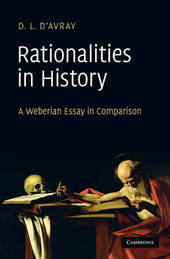
|
Rationalities in History: A Weberian Essay in Comparison
Hardback
Main Details
| Title |
Rationalities in History: A Weberian Essay in Comparison
|
| Authors and Contributors |
By (author) D. L. d'Avray
|
| Physical Properties |
| Format:Hardback | | Pages:224 | | Dimensions(mm): Height 235,Width 156 |
|
| Category/Genre | World history |
|---|
| ISBN/Barcode |
9780521199209
|
| Classifications | Dewey:901 |
|---|
| Audience | | Professional & Vocational | |
|---|
|
Publishing Details |
| Publisher |
Cambridge University Press
|
| Imprint |
Cambridge University Press
|
| Publication Date |
23 September 2010 |
| Publication Country |
United Kingdom
|
Description
In Rationalities in History the distinguished historian David d'Avray writes a new comparative history in the spirit of Max Weber. In a strikingly original reassessment of seminal Weberian ideas, d'Avray applies value rationality to the comparative history of religion and the philosophy of law. Integrating theories of rational choice, anthropological reflections on relativism, and the recent philosophy of rationality with Weber's conceptual framework, d'Avray seeks to disengage 'rationalisation' from its enduring association with Western 'modernity'. This mode of analysis is contextualised through the examples of Buddhism, Imperial China and sixteenth-century Catholicism - in the latter case building upon unpublished archival research. This ambitious synthesis of social theory and comparative history will engage social scientists and historians from advanced undergraduate level upwards, stimulating interdisciplinary discourse, and making a significant contribution to the methodology of history. D'Avray explores the potential of this new Weberian analysis further in his companion volume, Medieval Religious Rationalities.
Author Biography
D. L. d'Avray is Professor of Medieval History at University College London. A fellow of the British Academy since 2005, d'Avray has published widely on his research interests in medieval history.
Reviews'In this carefully crafted volume, D. L. d'Avray offers a strong argument about how various rationalities can be found in history and in populations around the world. By doing so, he discredits the association of formal rationality with modernity, and claims that instrumental reasoning is a human universal.' Raul Acosta, Journal of the Royal Anthropological Institute 'Unlike those historians who prefer to remain the prisoner of theories which are held unconsciously, David d'Avray's aim ... is to engage explicitly with the 'ideal types' of rationality catalogued in Max Weber's work in order to show their empirical value in the study of the religion of the medieval West ... constitute[s] a model of how historians can engage with social theory ... clearly and wittily written and resort[s] to technical jargon in order to clarify the argument rather than to obscure it ... logically structured and address[es] issues which are of interest not just to medievalists but also to historians of other periods, as well as to philosophers, anthropologists, sociologists and social theorists ... draw[s] effortlessly on an impressive range of empirical examples and [is] the product of wide reading in philosophy and social science.' S. H. Rigby, English Historical Review
|